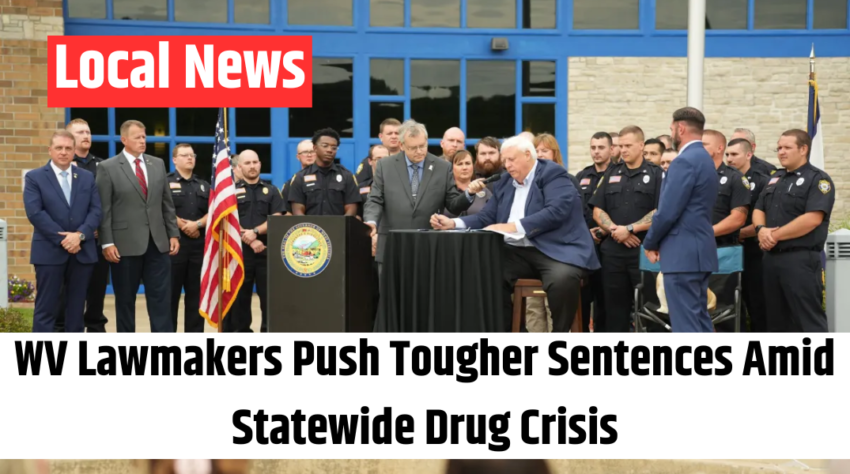Betty Hunter was just 12 years old when her mother introduced her to painkillers. Over the years, her substance use escalated—from prescription opioids to heroin and, eventually, fentanyl. By the time she was in her 30s, she was trapped in a cycle of addiction, selling drugs to sustain her habit.
“I’ve seen people take nearly a gram in one dose,” Hunter said, describing the potency of fentanyl, a synthetic opioid that has worsened West Virginia’s overdose crisis. With a gram of fentanyl-heroin mix selling for $75 to $100 on the street, she resorted to dealing to afford her next fix. Her lifestyle led to an arrest in 2021, landing her in jail for seven months while pregnant.
Hunter’s turning point came when a judge allowed her to go through drug court instead of serving more time behind bars. She completed outpatient treatment, rebuilt her life, and now helps others on their recovery journey. However, under a new law passed by the West Virginia Senate, people in situations like hers would face mandatory prison time—with no option for rehabilitation programs.
Tougher Sentences for Drug Offenses
Senate Bill 196, also known as Lauren’s Law, seeks to impose stricter penalties for drug-related crimes. The legislation would mandate a minimum five-year prison sentence for possession of just one gram of fentanyl, regardless of whether the person is a low-level dealer or an addict supporting their habit. Unlike current laws, there would be no opportunity for probation or treatment-based alternatives.
Additionally, the law allows prosecutors to charge an entire drug mixture as fentanyl if even a trace amount is detected, potentially leading to harsher penalties for individuals possessing substances unknowingly tainted with the opioid. The bill also increases the minimum sentence for basic drug distribution from one year to three years.
Supporters of the bill, including lead sponsor Sen. Vince Deeds, R-Greenbrier, argue that these measures are necessary to combat drug trafficking. A former state trooper, Deeds previously introduced legislation to make simple drug possession a felony but failed to gain enough support.
Also Read – Wild Weather Swing: From 80 Degrees to Snow in Just Days
“This bill is aimed at high-level traffickers,” Deeds said, pointing out that addiction-driven dealers often need intervention rather than prolonged incarceration. He suggested that a companion bill, designed to create a tiered sentencing system for possession—similar to DUI laws—could direct users into treatment instead.
Concerns Over Criminalizing Addiction
Critics of the bill warn that it could disproportionately punish individuals struggling with substance use disorder rather than major traffickers. Public defender Joe Hershberger, who has represented drug-related cases for 15 years, noted that most defendants he encounters are selling drugs solely to sustain their own addiction.
“There are a few people who do it for financial gain, but they’re the minority,” Hershberger said. He also expressed concern about the bill’s harsher conspiracy charges, which could lead to severe penalties for individuals unknowingly caught up in a dealer’s network—such as those who let a supplier crash at their home in exchange for drugs.
The financial impact of the bill is also a point of contention. West Virginia already faces rising correctional costs, with prison officials requesting an additional $49 million to cover food, medical care, and other expenses. Policy analysts estimate that the state spends about $35,000 per year to incarcerate one person. Under SB 196, tripling minimum sentences for certain offenses could drive that cost even higher.
A Divided Debate
During a Senate Judiciary Committee hearing, law enforcement officials like Jack Luikart, director of the state’s Fusion Center, testified that harsher sentences are effective at keeping drugs out of communities.
“I’ve worked on numerous drug investigations, and these laws make a difference,” Luikart stated.
However, criminal justice advocate Kenny Matthews, who spent 10 years in prison on drug charges, argued that the legislation could lead to unintended consequences. He pointed out that under SB 196, even a small amount of marijuana laced with fentanyl could trigger a mandatory prison sentence.
Sen. Mike Stuart, R-Kanawha, challenged Matthews, asking if he believed incarceration could lead to redemption.
“In some cases, yes,” Matthews responded. “But more often than not, prison breaks people.”
As West Virginia grapples with its opioid crisis, lawmakers remain divided on how to address drug-related offenses. While some push for stricter penalties, others believe that expanding access to treatment and rehabilitation programs is a more effective long-term solution .
